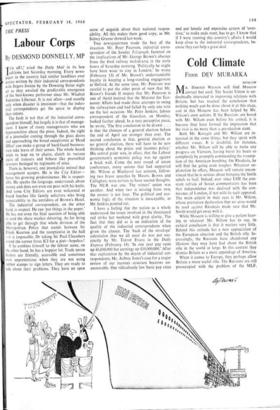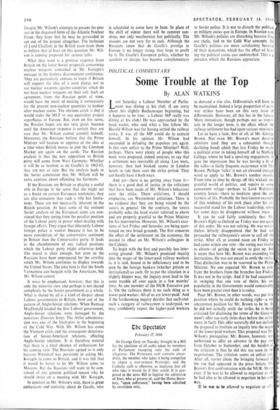Cold Climate
From DEV MURARKA
MOSCOW
MR. HAROLD WILSON will find Moscow correct but cool. The Soviet Union is un- doubtedly interested in improving relations with Britain, but has reached the conclusion that nothing much can be done about it at this stage, and in this Moscow has been helped by Mr. Wilson's own actions. If the Russians are bored with Mr. Wilson even before his arrival, it is because they have formed the impression that the visit is no more than a pre-election stunt.
Both Mr. Kosygin and Mr. Wilson are in- terested in the same things, but they speak with different voices. It is doubtful, for instance, whether Mr. Wilson will be able to make any progress on Vietnam, having burnt his boats so completely by promptly commending the resump- tion of the American bombing. On Rhodesia, he will find the going even tougher. Whatever ex- planation he offers, Moscow will remain uncon- vinced that he is serious about bringing the Smith rebels to heel. Indeed, ever since UDI the con- stant refrain of Soviet commentators has been that independence was declared with the con- nivance of London, if not with its tacit approval. The main culprit in their eyes is Mr. Wilson, whose premature declaration that no arms would be used against Rhodesia made sure that Mr. Smith would get away with it.
While Moscow is willing to give a patient hear- ing to whatever Mr. Wilson has to say, its cynical conclusion is that it matters very little. Behind this attitude lies a new appreciation of the European situation and the British role. In- creasingly, the Russians have abandoned any illusions they may have had about the British role in the world at large. In this context they dismiss Britain as a mere appendage of America.
When it comes to Europe, they perhaps allow Britain a more useful role. The Russians are still preoccupied with the problem of the MLF.
Despite Mr. Wilson's attempts to present the pro- ject in the disguised form of the Atlantic Nuclear Force, they hope that he may be persuaded to opt out of the project altogether. The inclusion of Lord Chalfont in the British team leads them to believe that at least on this question Mr. Wil- son is coming prepared for serious talks.
What they want is a positive response from Britain on the latest Soviet proposals concerning nuclear weapons contained in Mr. Kosygin's message to the Geneva disarmament conference. They are particularly anxious to know if Britain will support the idea of a joint pledge not to use nuclear weapons against countries which do not have nuclear weapons on their soil. Such an agreement, from the Russian point of view, would have the merit of making it unnecessary for the present non-nuclear countries to hanker after nuclear status. The obvious catch is that it would make the M LF or any equivalent project superfluous in Europe. But, even on this score, the Russian hopes are not very great, because until the American response is certain they are sure that Mr. Wilson cannot commit himself. Moreover, the Russians believe that the Prime Minister will hesitate to approve of the idea at a time when British -moves to join the Common Market are again on the cards. The Russian analysis is that the new opposition to British entry will come from West Germany. Whether it will be as resolute as de Gaulle's in 1962-63, they are not so sure. But the analysis leads to the Soviet conclusion that Mr. Wilson will be extra cautious about offending the Germans.
If the Russians see Britain as playing a useful role in Europe in the sense that she might act as a brake on certain European tendencies, they are also conscious that such a role has limita- tions. These are not necessarily inherent in the British position. At least some of the eminent Soviet analysts of the European scene are con- vinced that they spring from the peculiar position of the Labour party in power when dealing with foreign affairs. They argue that inherently Labour foreign policy is weaker because it has to be more considerate of the conservative sentiment in Britain than the Conservative party. It leads to the abandonment of any radical positions which the Labour party might otherwise hold. The moral is clear enough, but even so the Russians have been unprepared for the servility which Mr. Wilson continues to display towards the United States. The joke here is that the South Vietnamese can bargain with the Americans, but Mr. Wilson cannot.
It must be emphasised, however, that this is only the minority view and perhaps is not shared completely by the Soviet government as a whole. What is shared by all is a kind of despair about Labour governments in Britain, born. out of the pattern of Anglo-Soviet relations. When Ramsay MacDonald headed the first Labour government, Anglo-Soviet relations were damaged by the notorious Zinoviev letter. The Attlee administra- tion was one of the linch-pins in the beginning of the Cold War. With Mr. Wilson has come the Vietnam crisis and the consequent deteriora- tion of Soviet-American relations, affecting Anglo-Soviet relations. It is therefore natural that there is a total absence of enthusiasm for his coming visit. The Russians agreed to it only because Whitehall was persistent in asking Mr. Kosygin to come to Britain, and it was felt that it would be better to let Mr. Wilson come to Moscow. But the Russians still want to be con- vinced of any genuine political reason why he should insist on a meeting with Mr. Kosygin, In contrast to Mr. Wilson's visit, there is great enthusiasm and curiosity about de Gaulle, who is scheduled to come here in June. In place of the chill of winter there will be summer sun- shine, not only weatherwise but politically. The reasons are not very far to seek. Although the Russians know that de Gaulle's prestige in Europe is no longer rising, they hope to profit by it. De Gaulle's European policy, whether by accident or design, has become complementary to Soviet policy. It is not to disturb the political or military status quo in Europe. In Russian eyes Mr. Wilson's policies are disturbing because they are static, tied to the Cold War concepts. De Gaulle's policies are more satisfactory because of their dynamism, which has the effect of lea ing the political status quo undisturbed. This is a paradox which the Russians appreciate.































 Previous page
Previous page